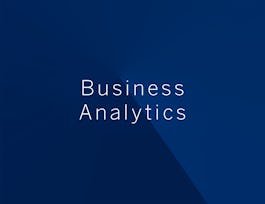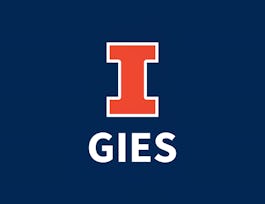The analytical process does not end with models than can predict with accuracy or prescribe the best solution to business problems. Developing these models and gaining insights from data do not necessarily lead to successful implementations. This depends on the ability to communicate results to those who make decisions. Presenting findings to decision makers who are not familiar with the language of analytics presents a challenge. In this course you will learn how to communicate analytics results to stakeholders who do not understand the details of analytics but want evidence of analysis and data. You will be able to choose the right vehicles to present quantitative information, including those based on principles of data visualization. You will also learn how to develop and deliver data-analytics stories that provide context, insight, and interpretation.



Communicating Business Analytics Results
This course is part of Advanced Business Analytics Specialization



Instructors: Manuel Laguna
Sponsored by Coursera Learning Team
26,878 already enrolled
(516 reviews)
What you'll learn
Identify the challenges of presenting analytics findings to decision makers
Evaluate the strengths and weaknesses of different communication methods for conveying analytics results to non-technical audiences
Skills you'll gain
Details to know

Add to your LinkedIn profile
5 assignments
See how employees at top companies are mastering in-demand skills

Build your subject-matter expertise
- Learn new concepts from industry experts
- Gain a foundational understanding of a subject or tool
- Develop job-relevant skills with hands-on projects
- Earn a shareable career certificate


Earn a career certificate
Add this credential to your LinkedIn profile, resume, or CV
Share it on social media and in your performance review

There are 4 modules in this course
In this module we’ll briefly review the Information-Action Value Chain we introduced in Course 1. Then we’ll see how analytical techniques are applied in business problems, first by looking at some “classic” business problems that have been around for a long time, then by looking at some “emergent” business problems that have resulted from more recent advances in technology.
What's included
4 videos1 assignment2 discussion prompts
In this module we’ll learn about a variety of visualizations used to illustrate and communicate data. We will start with the different vehicles used to present quantitative information. We will then look at a set of examples of data visualizations and discuss what makes them effective or ineffective. Finally, we discuss Excel charts and why most of them should be avoided. After completing this module, you will be able to better understand the characteristics of good data visualization and avoid common mistakes when creating your own graphs.
What's included
7 videos1 assignment2 discussion prompts
In this module we’ll cover a number of topics around interpreting data, gathering additional data, and pitching our recommendations based on our analysis. First, we’ll discuss ways in which we misinterpret or misrepresent data and how to avoid them, such as mistaking correlation with causation, allowing cognitive biases to influence how we see data, and visualizing data in misleading ways. We’ll also learn how experimentation can help us obtain more data, including compromises we may need to make in measurement. Finally, we’ll discuss how we communicate our results and recommendations, with a focus on knowing our audience, telling compelling stories, and creating clear and effective communication materials.
What's included
7 videos1 assignment2 discussion prompts
In our final module we’ll walk through two case studies and illustrate the ideas we’ve covered in the course and in the specialization as a whole. The first case shows how experimentation can be used to create data, sometimes with surprising results. The second case presents a comprehensive analysis that illustrates the entire analytic lifecycle, and shows how different methods and both quantitative and qualitative analysis can be brought together to solve one strategically important analytical problem.
What's included
4 videos2 assignments2 discussion prompts
Instructors

Offered by
Why people choose Coursera for their career




Learner reviews
516 reviews
- 5 stars
64.72%
- 4 stars
24.80%
- 3 stars
7.55%
- 2 stars
1.55%
- 1 star
1.35%
Showing 3 of 516
Reviewed on Oct 23, 2021
The course is great, the only thing is the author speak too fast for audience.
Reviewed on Dec 17, 2018
The best part of this course was the final week in which the instructor wonderfully presented and explained the case study.
Reviewed on Apr 22, 2020
This module can have tests on actual application rather than on multiple choice questions with very close answers
Recommended if you're interested in Data Science

Campus BBVA

University of Illinois Urbana-Champaign

University of Illinois Urbana-Champaign

University of Colorado Boulder

Open new doors with Coursera Plus
Unlimited access to 10,000+ world-class courses, hands-on projects, and job-ready certificate programs - all included in your subscription
Advance your career with an online degree
Earn a degree from world-class universities - 100% online
Join over 3,400 global companies that choose Coursera for Business
Upskill your employees to excel in the digital economy


